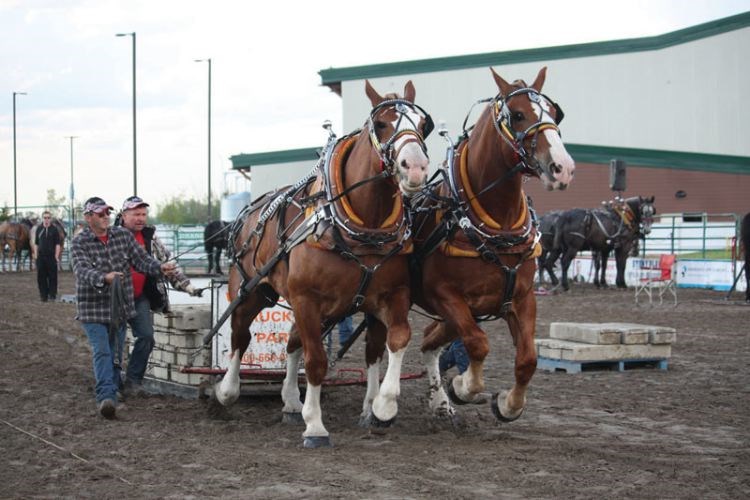Fred and Jack came all the way from Quebec to haul heavy loads for Zane Pickering.
They're so good at what they do, it's routine for them to drag a loaded metal sled more than double their body weight over an arena infield. All they ask in return is 40 pounds of food each day and about 10 gallons of water to wash that down and they're good to go.
Fred and Jack and their buddies from Ontario, Tony and Andy, are Belgian heavy horses. Each of them weighs close to 2,200 pounds, about the weight of '60s-era Volkswagen Beetle. The natural horsepower they can muster in heavy horse pulls would leave a mechanical Beetle spinning its wheels in the dirt. They've pulled off feats of strength lately that are making their owner proud.
Two weekends ago at the Kinsmen Farmers' Day Rodeo & Exhibition in Stony Plain, Alta., Fred and Jack teamed up to win the heavyweight division heavy horse pull and they did it again Saturday at the Pioneer Days fair in McBride.
"We pulled 8,500 pounds, which is well over twice the horse's weight," said Pickering, in reference to the Stony Plain event. "Fred is the oldest one at eight years old but he's had minimal pulling experience before we had him. It was pretty cool to go beat those oldtimers. They've been through nine or 10 years of pulling, they're well-schooled teams."
In McBride, Fred and Jack outmuscled the team that won the Falkland Stampede in mid-May, when they had to settle for fourth.
The heavy horse competition involves teams of two horses dragging a steel stone-boat weighed down with cement blocks. If none of the teams can reach the required 14 feet, the winner is whichever team can pull the weight furthest. Depending on the type of ground, Pickering's heavyweight stars can pull as much as 11,000 pounds.
It takes a massive horse to pull that much weight and Pickering's Belgians are huge. They stand 20 hands high (six-foot-eight) from the ground to the withers (top of the shoulder blades) and their powerful chests are 40 inches wide (twice that of a saddle horse).
Dieting and vigourous exercise are essential for heavy horses and Pickering and teamster Delbert Dillman, who holds the reins, put the horses to work four or five hours per day at the farm in Pineview.
Draft horses were the working animals of Canadian farms in the early decades of the 1900s. The heavy horse breeds - Cydesdales, Shires, Belgians and Percherons - were essential to grain farmers for their ability to move heavy loads and plough fields. In the years before tractors with internal combustion engines and other motorized farm implements became mainstream, most farms needed a stable of at least 10 heavy horses to work the fields.
The heavy horse pull started out as a way for farmers to settle bets as to who had the strongest team and it grew to become a staple competition at fairs like the Prince George Exhibition (now the B.C. Northern Exhibition), Falkland Stampede, Royal Manitoba Winter Fair and Calgary Stampede. The event is popular in Ontario and the midwestern United States, especially among Amish communities.
The prize money available in Calgary isn't huge - $2,500, but the prestige factor of winning at the Greatest Outdoor Show on Earth makes the July 4-13 event tantalizing to Pickering. The heavy horse pull for heavyweights happens on the last day of the 10-day Stampede and Pickering will have his two teams entered.
"The Calgary Stampede is the largest one in Canada and they have similar ones in the States at annual state fairs," said Pickering, who owns Falcon Contracting in Prince George. "We haven't gone [into the United States], first we want to conquer Calgary."
For the first four days in Calgary, Pickering will be showing a hitched wagon team of Clydesdales in the heavy horse show, where they will be judged on their appearance and ability to respond to the teamster's commands while manoeuvring set courses in the arena. In total he'll have 10 horses involved in the Calgary Stampede.
In May, Pickering went on a fact-finding mission to Indiana and spent a week in an Amish community, where people still rely on horse-and-buggy rigs for transportation and heavy horses are tools of choice to work the fields. Pickering bought three prized Clydesdales from his Amish hosts.
"What we gained from them is traditional knowledge about the horse farming culture and how it's never changed," said Pickering. "Horse-drawn implements that were used in the 1800s and early-1900s are still used today. They're revamped and rebuilt, a lot of them with wooden leads. Those talents as blacksmiths and farriers are still alive amongst us today and they're kept alive through promotions of agriculture as a whole."
Pickering, 52, was born and raised on a Prince George potato farm and remembers when the agricultural component of the Prince George Exhibition and its many offshoots drew widespread participation from the local community. His will to keep that tradition alive is what drives his ambition to compete as a heavy horse owner.
"The PGX used to have twice as much agriculture stuff in the fairs as we see now, so it's really dropped," he said. "When people get involved and relive it so the kids can see it, it's huge."



